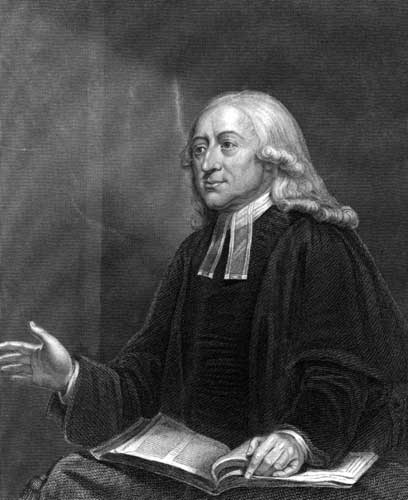Cracked: the Wesley code
Tension between Charles and John has been laid bare by translation of 270-year-old diary. By James Macintyre

A 270-year-old diary of Charles Wesley, one of the country's foremost hymn-writers, has revealed the extent of the author's depression, anxiety over his wife's miscarriage and disputes over the future of the Methodist Church founded by his brother John.
The coded diary, written between 1736 and 1756, has been decrypted by a Liverpool professor who worked on 1,000 hand-written pages for 10 years. It sheds a highly personal and human as well as religious light on the author of a number of famous hymns including "Hark! The Herald Angels Sing," and "Soldiers of Christ, Arise".
The passages, previously hidden by a heavily abbreviated code, reveal that Charles strongly disapproved of John's marriage and disagreed with his brother over the question of a breach with the Church of England, into which both brothers had been ordained.
The diaries' code was cracked by the Rev Professor Kenneth Newport, Liverpool Hope University's pro vice-chancellor for research and academic development. By using transcribed gospels written in the same code by Wesley for his own use, and comparing the passages with those in the King James Bible using the code's symbols and abbreviations, Professor Newport was able to translate the diaries and shed light on the disputes, which have previously been skirted over in separate Wesley manuscripts.
"The code is abbreviated severely, often without vowels," said Professor Newport. "A lot of it is religious language, and he would abbreviate common phrases with one letter – so 'righteousness' would become an 'r', 'wickedness' would become a 'w', so seeing how severely he was abbreviating things was quite helpful."
Professor Newport, an Anglican priest, says he has long been "inspired by Charles Wesley on a number of fronts". "The interesting thing about the journal is what you get is a raw, unedited version of things," he said. "When history is written it is largely based on a sanitised version: shorthand is a way of storing away information.
"This is a warts-and-all portrait of what was happening on the ground; it's the eerie privilege of peering over the shoulder of one long-dead and looking into their world. It is in many ways an ordinary diary. Wesley was quite often depressed about things and you see him struggling in depression, and you see his faults as well as his strengths and virtues."
The diaries confirm Wesley's clear opposition to a break-off from the Church of England. "There was a suspicion of lay preaching and Methodism was frowned upon by the established church," said Professor Newport. "Charles had a very clear line on separation. He wrote: 'I am for church first and then Methodism.'"
One personal section of the diaries reveals an unusual pact made by the brothers. Charles wrote: "My brother and I having promised each other that we would neither of us marry, or take any step towards it, without the other's knowledge and consent," he wrote. Later, however, Charles expressed his frustration when John planned to marry Grace Murray. "He [John] is insensible of both his own folly and danger, and of the divine goodness in so miraculously saving him," Charles wrote
He also wrote of his own wife's miscarriage, and speculated whether he was partly to blame. "Sally is slowly recovering her strength after her miscarriage last week," he wrote. "How far it was occasioned by our late affliction, I cannot say, but my brother has cast poison into the cup of temporal blessings, and destroyed as far in him lay all future usefulness to the church."
Brothers in alms
Charles Wesley (1707 – 1788)
Followed his father and brother into the Methodist Church in 1735, and emerged as a leading member of the Methodist movement. Charles is best known for the string of popular hymns he wrote. He founded Wesley Chapel in Brayton, south of Selby.
John Wesley(1703 – 1791)
Founded the Methodist Church. A popular figurehead, he was responsible for the emergence of a radical new form of Evangelicalism in the UK, but – partly on the advice of his brother – he stayed within the Anglican Church.
Join our commenting forum
Join thought-provoking conversations, follow other Independent readers and see their replies
Comments
Bookmark popover
Removed from bookmarks